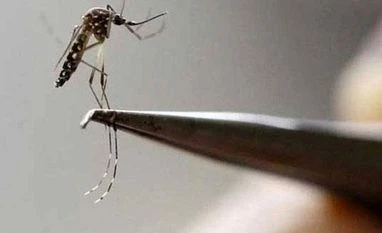The first ever malaria vaccine went into phase 4 trials this week. About 360,000 children in Ghana, Kenya and Malawi will receive doses of the vaccine, RTS,S. This is manufactured by GSK and released under the brandname, Mosquirix. It is described as a “complementary malaria control tool” by the World Health Organization (WHO).
Something over 435,000 malaria-related deaths occurred in 2017, and young children were the most at risk. Young African children are the worst-affected. Malaria kills as many as 250,000 African children under the age of five every year. That’s a huge proportion of the 266,000 children who died of malaria in 2017, when there were about 219 million cases spread across 100 countries.
The vaccine took over 30 years to develop and cost close to $500 million. It is only partially effective, acting only against the Plasmodium falciparum parasite and not against the other major malaria parasite, Plasmodium vivax. The vaccine prevents malaria only about 40 per cent of the time. But even that partial protection is better than nothing.
The difficulties of developing an anti-malaria vaccine were described graphically by Bill Gates (the Bill and Melinda Gates Foundation has helped fund the vaccine development and other measures against malaria). Gates described the malaria parasite as a "deadly shapeshifter".
There are different malaria parasites and these transform several times within the body of an infected person. Each parasite can present at least 60 different proteins, and the proteins it does present, keep altering. Our immune system works by recognising one specific protein, which it associates with a virus, bacteria or parasite.
Vaccines also work on similar lines. The best “multi-protein” vaccines (developed against penumonia) can handle up to a dozen different proteins. Hence, malaria fools the immune system and slides past most defences. In addition, any vaccine which targets children has to checked out stringently for side-effects.
RTS,S went through a phase 3 trial, from 2009 to 2014, with approximately 15,000 children and infants in the seven nations of Burkina Faso, Gabon, Ghana, Kenya, Malawi, Mozambique, and the United Republic of Tanzania. A four-dose schedule is required. The first dose is given as soon as possible after five months , with dose 2 and dose 3 at monthly intervals and the last dose around the second birthday.
WHO claims, “Among children aged 5-17 months who received four doses of RTS,S, the vaccine prevented approximately four in 10 (39 per cent) cases of malaria over four years of follow-up. It prevented about three in 10 (29 per cent) cases of severe malaria, and reduced the need for blood transfusions by 29 per cent.” (Severe malaria is defined as cases where the initial infection evolves into acute, life-threatening illness.)
The EU’s European Medicines Agency cleared the vaccine for more general use, after reviewing the phase 3 results. There are side-effects, including local pain and swelling, and some cases of fever and a few seizures. But these seem to be transient with no long-term consequences. Two potential areas of worry: There were more cases of meningitis among the vaccinated, and while severe malaria was reduced by 29 per cent, in the cases where it did occur, there were more cases of cerebral malaria. However, no causal links were discovered. The phase 4 will last until around 2022 and the results will be carefully reviewed before the vaccine is introduced for routine use.
GSK actually developed RTS,S, way back in 1987. In 2001, GSK began collaborating with the Seattle-based non-profit PATH. PATH’s Malaria Vaccine Initiative helped GSK continue developing RTS,S. The phase 3 trials were supported by a network of 11 African research institutes spread across the seven nations with support from the Gates Foundation. WHO says that the phase 4 is being funded through 2020 at least by a combination of Gavi, the Vaccine Alliance (this is a startup from the Gates Foundation), the Global Fund to Fight AIDS Tuberculosis and Malaria, and Unitaid.
WHO’s anti-malaria strategy is built around using insecticide-treated nets and indoor residual spraying, along with the use of larvicides, and personal protection measures like repellents and insecticide-treated clothing.
The battle against malaria has logged several successes. Between 2000 and 2015, cases reduced by 41 per cent globally and there was a 62 per cent reduction in deaths. But there were more cases in 2017 than in 2015. India contributed about 4 per cent of all malaria cases in 2017 but it managed to reduce the number of cases by 24 per cent from 2016. An anti-malaria vaccine could be a potent additional weapon in the fight against this disease.
Unlock 30+ premium stories daily hand-picked by our editors, across devices on browser and app.
Pick your 5 favourite companies, get a daily email with all news updates on them.
Full access to our intuitive epaper - clip, save, share articles from any device; newspaper archives from 2006.
Preferential invites to Business Standard events.
Curated newsletters on markets, personal finance, policy & politics, start-ups, technology, and more.
)